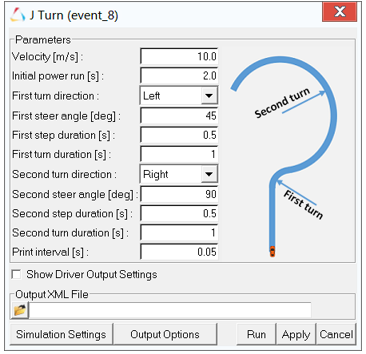J-turn
A J-turn event simulates a vehicle response to a large steer in one direction, a dwell time to allow the vehicle to react, and a large steer in the opposite direction, with an additional reaction time.
The event is used to characterize the stability of vehicles. Both steer directions can be run by reversing the sign of the steering inputs. The Altair Driver is used to maintain a constant speed and standard outputs for the vehicle and tires are included in the Tire system and the Output Requests system. A plot template is available to plot the results.
A better name for the event is Fishhook maneuver. The event is designed to be able to simulate the NHTSA fishhook test as described in DOT publication DOT HS 809 705, “Phase VIII of NHTSA’s Light Vehicle Rollover Research Program-A Demonstration of the Dynamic Tests Developed for NHTSA’s NCAP Rollover Rating System”.

Figure 1.
| Parameter | Description |
|---|---|
| Velocity | Initial vehicle velocity (meters/sec). |
| Initial power run | The time at the beginning of the event. This time is used to verify the vehicle reached steady state. The event has an additional 0.5 seconds of fixed time added at the start of the event. |
| First turn direction | Defines the steer direction used in the first turn. |
| First steer angle | Angle in degrees of the initial steer input. A positive number turns the vehicle right and a negative number turns the vehicle left. |
| First step duration | Time required to input the First steer angle. The step function is used to input the angle to the steering wheel. |
| First turn duration | Time the steering is held fixed at the First steer angle. |
| Second turn direction | Defines the direction used in the second turn. |
| Second steer angle | Angle in degrees of the second steer input. A positive number turns the vehicle left and a negative number turns the vehicle right. |
| Second step duration | The time required to input the Second steer angle. A step function is used to input the angle and uses the Second turn duration and Second steer angle as inputs |
| Second turn duration | The time the vehicle steering is held at the Second steer angle input. The event ends 1.5 seconds after the Second turn duration time occurs. |
| Print interval | Data is output to the plot files and graphics file at this time interval (seconds). |
References
ISO +7401-2003 – Road Vehicles-Lateral transient response test methods-Open-loop test methods.